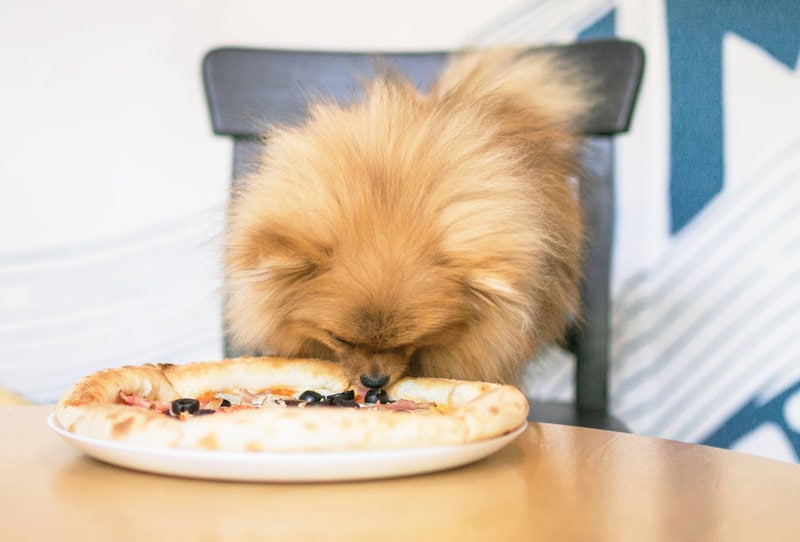Pizza has a delicious aroma that is tempting to both humans and dogs. Dogs get excited whenever there is pizza around, making it very difficult to refuse them a piece, even when you don’t want to share. This excitement might get you wondering if dogs can eat pizza?
No, dogs should not be eating pizza. Feeding pizza to dogs is not a good idea because some ingredients, such as pizza sauces, herbs, and spices, can be detrimental to dogs’ health. Consuming pizza can cause diarrhea, dehydration, and rapid weight gain in dogs.
Now, you know pizza isn’t safe for dogs, but what about pizza crust? Or what if it’s too late and your dog already ate pizza? What should you do? What are the consequences if dogs eat pizza? Continue reading to learn the answers to all these questions and more! But first, let’s review what pizza ingredients are most dangerous for dogs.
Are Dogs Allowed To Eat Pizza?
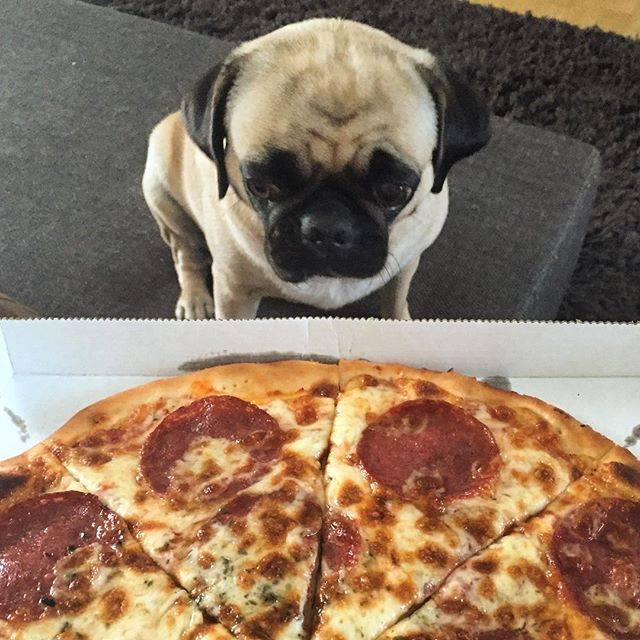
Certainly not! Dogs should not be allowed to eat pizza. As much as dogs get excited or try to steal pizza from your plate, never give your dog pizza, especially store-bought pizzas where you’re not certain of the ingredients. Besides the standard ingredients, such as dough and cheese, pizza contains some harmful ingredients that are detrimental to your dog’s health.
Though these two ingredients are not exactly harmful to dogs in small amounts, many common pizza toppings have ingredients like garlic, onion, and pepper, which are quite bad for dogs. These toxic ingredients are the reason we advise you not to give your dog pizza. You can never be too sure what pizza contains.
Is It Safe For Dogs To Eat Pizza?
It is not safe for dogs to eat pizza. If you must give pizza to your dog, it should only be the pizza you have made so you know it does not contain ingredients that are harmful to your dog. Also, feed your pooch small scraps without any toppings, just the dough, and a little cheese.
Dogs can react badly to pizza, experiencing digestive system problems. Some dogs might be lactose intolerant, reacting badly to cheese.
Also, the high salt content in pizza can trigger hypertensive dogs, causing illness. Pepper can cause diarrhea in dogs. These are just a few consequences of feeding pizza to your dog. If your dog has severe reactions to pizza, see a vet immediately.
Why Is Pizza Bad For Dogs?
There are plenty of foods humans eat that dogs can only handle in little bits, but pizza is not one of them. Even small amounts of pizza can lead to health issues for dogs:
Weight Gain
Pizza contains lots of calories and fatty ingredients. Unless your dog eats very small amounts over long stretches of time, your pooch is likely to gain weight. Weight gain can lead to other serious ailments like diabetes, which can shorten or even end your dog’s life.
Dehydration
Pizza contains high salt quantities. Too much salt can cause hypertension in dogs, and too much sodium leads to dehydration in dogs.
Dehydration and loss of body fluid can lead to death in dogs.
Diarrhea
Cheese is made from curdled milk. Milk is lactose, and some dogs might have a lactose intolerant condition. Dogs’ digestive systems will not digest the lactose in the pizza, causing severe bowel and stomach problems.
Other health issues that can arise from feeding pizza to your dog include dizziness, shortness of breath from the spices, and throat irritation. Avoid giving toppings and pizza sauce to dogs, and see a vet if you observe any health problems.
Do Dogs Love Pizza?
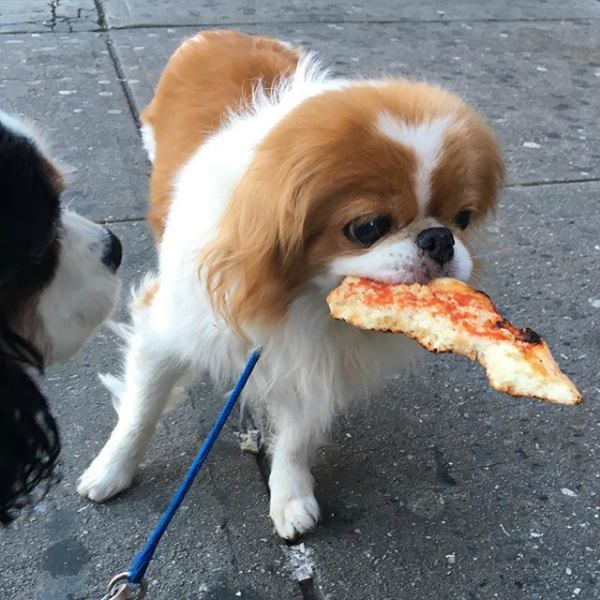
The aroma of pizza fresh out of the oven is perhaps one of the best smells in the world. Dogs love pizza just as much as any human does. It is safe to say that our canine friends love pizza even more because the sensitivity levels of their noses are five times greater than that of humans.
You may have noticed how excited dogs get when they catch a whiff of a nearby pizza. Pooches may even jump to take a bite or try to steal the whole pizza. But no matter how much doggies crave pizza, do not feed them pizza for their own good.
Why Do Dogs Love Pizza Crust?
Dogs love the crust of a pizza because of the aroma of freshly baked bread crusts and their love for bread. You’ve probably seen videos of dogs chomping down on bread or pizza as they just cannot help themselves when surrounded by such aromatic foods.
The aroma produced by a rising pizza crust is relatively similar to the baking of bread, except for the addition of herbs. Herbs, such as basil and oregano, are often added to enhance the overall pizza’s flavor. When treated with heat, these herbs emit fragrances that can combine with the aroma of the pizza’s crust to capture any nearby dogs.
Will Pizza Hurt My Dog?
Yes, pizza may hurt your dog. Pizza comes with toppings and sauces with different herbs and vegetables, such as garlic and onion. Some herbs are not safe for dogs to eat. Onions and garlic can cause severe stomach upset for your dog. Cheese can cause diarrhea, spices can cause neurological damage, and salt can lead to hypertension for your dog.
Most pizza ingredients aren’t beneficial to dogs and are, in fact, harmful to dogs. So we advise carefully confirming all the ingredients in a pizza and verifying it is safe before sharing small amounts with your canine friend.
Why Can’t Dogs Eat Pizza Crust?
Dogs can’t eat pizza crusts because they often contain sugar, oil, and salt. Some crusts also come with sauces and cheese stuffings that might harm dogs. Pizza crust includes a high quantity of carbohydrates, salt, and calories and can also have traces of herbs and spices in the sauce that are harmful to dogs.
Even homemade pizza crusts without additives have no health benefits to a dog since they contain only flour and water. While pizza crust may not be bad for a dog, it is not healthy either, and excess consumption can cause unhealthy weight gain, leading to other ailments.
Can Dogs Have Pizza Rolls?
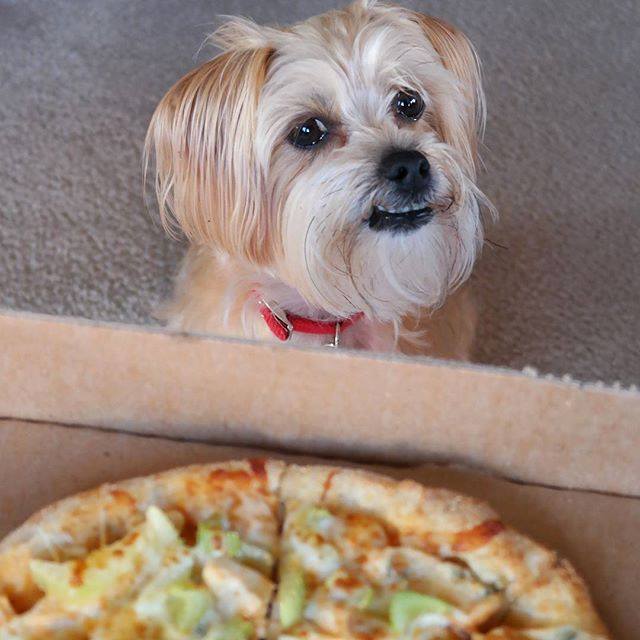
No, dogs should never eat pizza rolls. The number one reason is that they contain toxic ingredients, though there are plenty of reasons they shouldn’t. Pizza rolls contain garlic and onions, which are very harmful to dogs and can cause severe side effects, such as stomach upset and indigestion.
A dog eating one pizza roll might not be fatal, but more than one can cause harm. Pizza rolls contain many calories that can cause obesity in dogs and lack nutritional value. Feeding dogs pizza rolls can result in the dog rejecting a regular balanced diet.
Besides obesity, dogs can also develop pancreatitis from too many fatty foods like pizza rolls. Although a small amount is no cause for alarm, contact the vet immediately if your dog eats several pizza rolls or any with toxic ingredients.
What If My Dog Eats A Whole Pizza?
If your dog eats a whole pizza, it could cause serious stomach aches, diarrhea, and even pancreatitis. Your dog could be lactose intolerant, meaning the cheese can trigger diarrhea and vomiting. Pizza toppings are also very dangerous to dogs due to their herbs.
If your dog eats a whole pizza, monitor the dog for 6 to 12 hours for any side effects. If you observe any, call the vet immediately to prevent more damage to the dog’s health or even death.
What If My Dog Eats Pizza Slices?
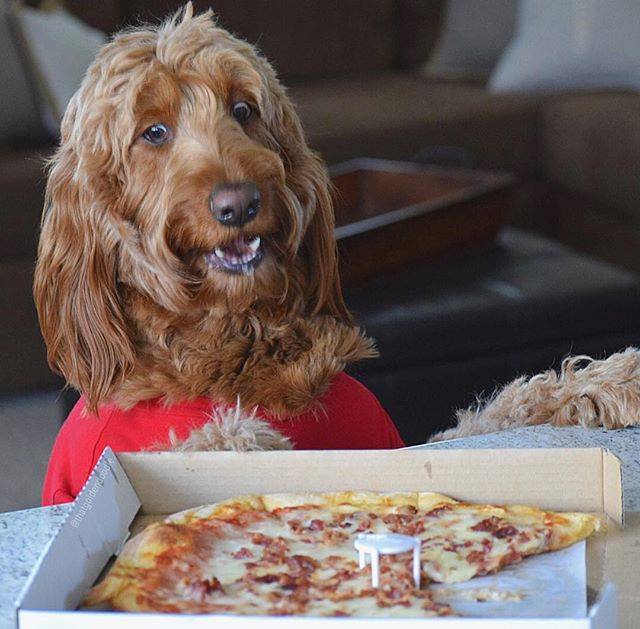
If your dog eats pizza slices or small bites of pizza, this might not have an immediate harmful effect, but larger portions can cause harm. Watch your dog for any signs of vomiting, excessive stooling, dizziness, or stomach upset. If you observe any of these symptoms, do not attempt to feed the dog anything else. Either take the dog to the vet or call a vet to attend to your dog immediately.
Pizza is not a good snack for your dog and should be avoided. If you must give your dog pizza, then the toppings and sauce must be scraped off, so you’re only feeding the crusts to the dog. Otherwise, you can give your pooch homemade pizza using safe ingredients that won’t harm your canine friend.

